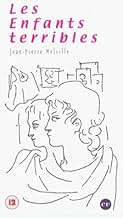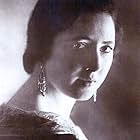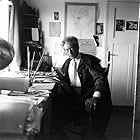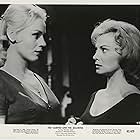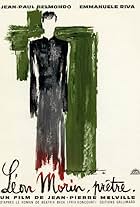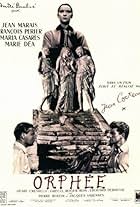IMDb RATING
6.9/10
4.4K
YOUR RATING
The dangerously obsessive relationship between a psychologically manipulative brother and sister who isolate themselves and draw others into their mind games.The dangerously obsessive relationship between a psychologically manipulative brother and sister who isolate themselves and draw others into their mind games.The dangerously obsessive relationship between a psychologically manipulative brother and sister who isolate themselves and draw others into their mind games.
- Nominated for 1 BAFTA Award
- 2 nominations total
Jean Cocteau
- Narrator
- (voice)
Karin Lannby
- The Mother
- (as Maria Cyliakus)
Storyline
Did you know
- TriviaJean Cocteau was allowed a day of shooting, when Jean-Pierre Melville wasn't feeling up to the mark. Cocteau was to follow Melville's instructions exactly or do nothing at all. Eight shots in all, which were supposed to be of a summer's day but were done in midwinter in the rain.
- GoofsThe amount of blood on Paul's face changes between when he is in the shop and when he is in the taxi.
- Alternate versionsThe song that Michael sings while sitting at the piano was deleted for the original American release.
- ConnectionsEdited into Histoire(s) du cinéma: Une vague nouvelle (1999)
- SoundtracksConcerto in A minor for 2 violins and string orchestra (Opus 3, No. 8; RV 522)
Written by Antonio Vivaldi
Featured review
Based on a novel by Jean Cocteau who also wrote the screenplay and provided the narrative voiceover, Jean-Pierre Melville's Les Enfants Terribles is a psychological duel between a brother and sister that takes them from poverty to wealth, all while playing a dangerous game that they can't stop playing. Expanding his cast of characters from three to four, essentially, Melville also expands the visual scope to tell the story of two terrible children who can't help but hurt each other.
Paul (Edouard Dermit) gets hit with a snowball in the chest at school, leading to his collapse. His weak chest simply could not take the hit, no matter how light, and he's taken home to be nursed by his older sister Elisabeth (Nicole Stephane) who also nurses their invalid mother. Witnessed by Gerard (Jacques Bernard), a school friend of Paul's, we see the contentious relationship between the two siblings. She doesn't believe that he's sick. He doesn't care that she doesn't. She still takes care of him because to the two of them it is all just a game that they must play, and that defines the entirety of the film. Whether we're told explicitly or not, the two never stop playing their game with loose rules other than an embrace of danger and egging each other on.
When their mother dies, the two are left alone (presumably with some money from their mother which allows them to survive, along with the good doctor deciding to pay for their maid), and they grow inward. Gerard often stops by to see the status of his friends, and the room they share becomes increasingly chaotic and messy, despite both siblings insisting that they would have clean rooms on their own. The three take a vacation to the seaside (banked by Gerard's rich father) where they extend their game into petty theft. One must steal something of no practical use from a small shop while Gerard's father purchases a hat. When Gerard steals a brush, far too useful an object, he must go back and steal a watering can (also a useful object, but far larger).
It seems as though their games are taking a toll on them both, and Elisabeth decides that she must get out and get a job, despite Paul's protestations. She takes the job of a model in a clothing store and quickly becomes friends with Agathe (Renee Cosima) and brings her home to live in their mother's room (that neither of the two siblings ever took up their mother's room is never mentioned, but it feeds the subtext). It's obvious that there are emotions running around everywhere under the surface. Gerard hanging around only really makes sense if he finds an attraction to Elisabeth. Paul ruthlessly insults Agathe, but she sticks around because she obviously has feelings for him. Elisabeth lords over it all, playing her game, even as it becomes obvious that people are feeling real pain over what's going on.
Elisabeth, through her work, meets a rich American Jew Michael (Melvyn Martin) and the two quickly marry, though he dies in a car accident between their wedding and their honeymoon. The death leaves Elisabeth with a huge house that she invites her brother and two friends to occupy with her, and with no need for money or any other actions for basic survival, the quartet fester and stew in that house. They all have separate rooms, but they end up sleeping in Elisabeth's together. When Paul can't take it anymore, he moves all of his things, recreating the room they shared at their mother's home, in the great hall of the house, attracting many visits from his fellow denizens of the house and also going only as far as he can in striking out independently from Elisabeth. He's dependent on her both financially and emotionally. Despite the ill-natured morass that she creates, he cannot get away.
And that's when Elisabeth takes the game too far. She never seems to think so, despite her final actions, but it all just feels like extensions of an insular, destructive game of a malignant child. The subdued emotions of her tenants come to the surface. Agathe admits to Elisabeth that she loves Paul. Paul writes a letter of love to Agathe but, in his poor emotional state, addresses the letter to himself instead of to Agathe. Elisabeth finds the letter, reads it, and destroys it, playing both sides against each other by telling Agathe that Paul has no feelings towards her but Gerard does while telling Paul that Agathe loves Gerard. She also confronts Gerard, telling him that Agathe loves him, but it's obvious that Gerard only falls into the proposed relationship to keep Elisabeth happy.
Poison is introduced, Elisabeth quotes Lady Macbeth, and the whole thing comes to its end with death in a very French manner.
Les Enfants Terribles is the story of a woman with no morals, perhaps a nihilist, who sees everyone around her as her playthings. She twists and manipulates everyone to suit her own interests which never seem to be more than filling time. It's a portrait of decadence and maliciousness in the form of children (really, all four main actors easily look like they're in their twenties even though Paul and Gerard are supposed to be about sixteen). Stephane is the standout of the cast, in a marked contrast to her nearly silent role in La Silence de la Mer, constantly talking and scheming with her eyes.
As a psychological drama, I find Les Enfants Terribles to be involving, twisting, and terrifying. Perhaps older generations are always scared of the next generations turning out as monsters.
Paul (Edouard Dermit) gets hit with a snowball in the chest at school, leading to his collapse. His weak chest simply could not take the hit, no matter how light, and he's taken home to be nursed by his older sister Elisabeth (Nicole Stephane) who also nurses their invalid mother. Witnessed by Gerard (Jacques Bernard), a school friend of Paul's, we see the contentious relationship between the two siblings. She doesn't believe that he's sick. He doesn't care that she doesn't. She still takes care of him because to the two of them it is all just a game that they must play, and that defines the entirety of the film. Whether we're told explicitly or not, the two never stop playing their game with loose rules other than an embrace of danger and egging each other on.
When their mother dies, the two are left alone (presumably with some money from their mother which allows them to survive, along with the good doctor deciding to pay for their maid), and they grow inward. Gerard often stops by to see the status of his friends, and the room they share becomes increasingly chaotic and messy, despite both siblings insisting that they would have clean rooms on their own. The three take a vacation to the seaside (banked by Gerard's rich father) where they extend their game into petty theft. One must steal something of no practical use from a small shop while Gerard's father purchases a hat. When Gerard steals a brush, far too useful an object, he must go back and steal a watering can (also a useful object, but far larger).
It seems as though their games are taking a toll on them both, and Elisabeth decides that she must get out and get a job, despite Paul's protestations. She takes the job of a model in a clothing store and quickly becomes friends with Agathe (Renee Cosima) and brings her home to live in their mother's room (that neither of the two siblings ever took up their mother's room is never mentioned, but it feeds the subtext). It's obvious that there are emotions running around everywhere under the surface. Gerard hanging around only really makes sense if he finds an attraction to Elisabeth. Paul ruthlessly insults Agathe, but she sticks around because she obviously has feelings for him. Elisabeth lords over it all, playing her game, even as it becomes obvious that people are feeling real pain over what's going on.
Elisabeth, through her work, meets a rich American Jew Michael (Melvyn Martin) and the two quickly marry, though he dies in a car accident between their wedding and their honeymoon. The death leaves Elisabeth with a huge house that she invites her brother and two friends to occupy with her, and with no need for money or any other actions for basic survival, the quartet fester and stew in that house. They all have separate rooms, but they end up sleeping in Elisabeth's together. When Paul can't take it anymore, he moves all of his things, recreating the room they shared at their mother's home, in the great hall of the house, attracting many visits from his fellow denizens of the house and also going only as far as he can in striking out independently from Elisabeth. He's dependent on her both financially and emotionally. Despite the ill-natured morass that she creates, he cannot get away.
And that's when Elisabeth takes the game too far. She never seems to think so, despite her final actions, but it all just feels like extensions of an insular, destructive game of a malignant child. The subdued emotions of her tenants come to the surface. Agathe admits to Elisabeth that she loves Paul. Paul writes a letter of love to Agathe but, in his poor emotional state, addresses the letter to himself instead of to Agathe. Elisabeth finds the letter, reads it, and destroys it, playing both sides against each other by telling Agathe that Paul has no feelings towards her but Gerard does while telling Paul that Agathe loves Gerard. She also confronts Gerard, telling him that Agathe loves him, but it's obvious that Gerard only falls into the proposed relationship to keep Elisabeth happy.
Poison is introduced, Elisabeth quotes Lady Macbeth, and the whole thing comes to its end with death in a very French manner.
Les Enfants Terribles is the story of a woman with no morals, perhaps a nihilist, who sees everyone around her as her playthings. She twists and manipulates everyone to suit her own interests which never seem to be more than filling time. It's a portrait of decadence and maliciousness in the form of children (really, all four main actors easily look like they're in their twenties even though Paul and Gerard are supposed to be about sixteen). Stephane is the standout of the cast, in a marked contrast to her nearly silent role in La Silence de la Mer, constantly talking and scheming with her eyes.
As a psychological drama, I find Les Enfants Terribles to be involving, twisting, and terrifying. Perhaps older generations are always scared of the next generations turning out as monsters.
- davidmvining
- Apr 24, 2022
- Permalink
- How long is The Terrible Children?Powered by Alexa
Details
- Release date
- Country of origin
- Official sites
- Languages
- Also known as
- Nesnosna deca
- Filming locations
- Production company
- See more company credits at IMDbPro
- Runtime1 hour 45 minutes
- Color
- Aspect ratio
- 1.37 : 1
Contribute to this page
Suggest an edit or add missing content

Top Gap
By what name was The Terrible Children (1950) officially released in Canada in English?
Answer



